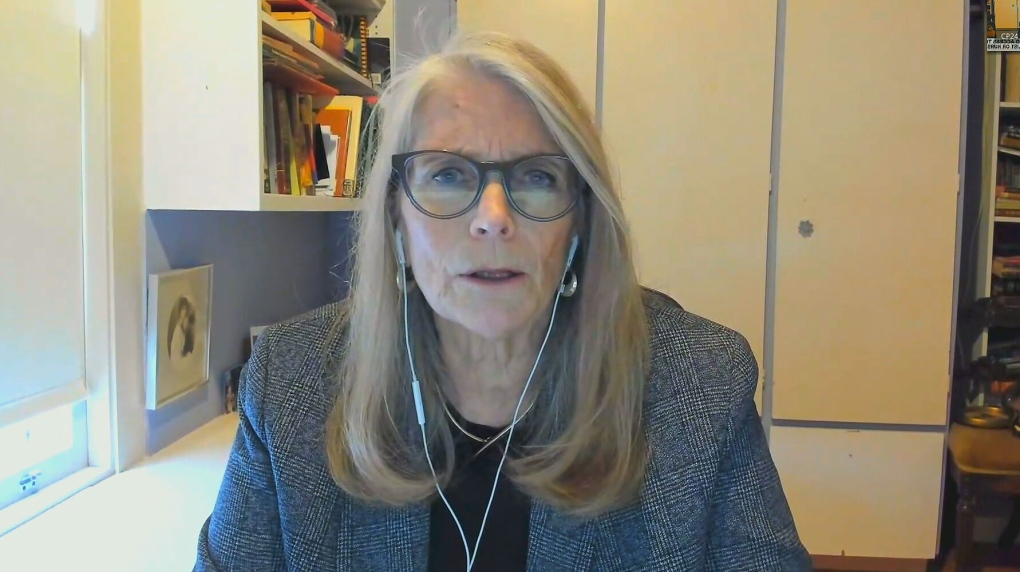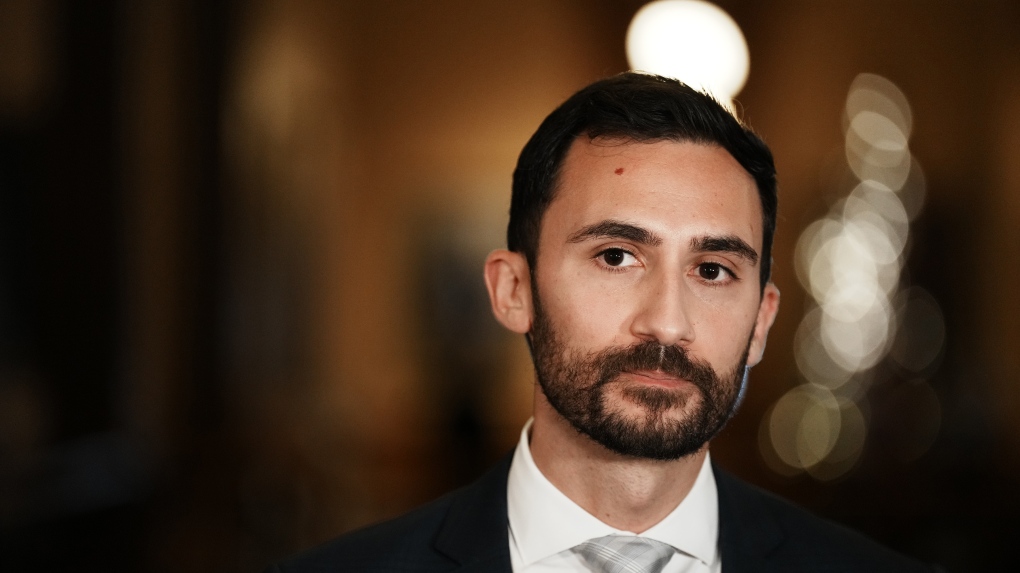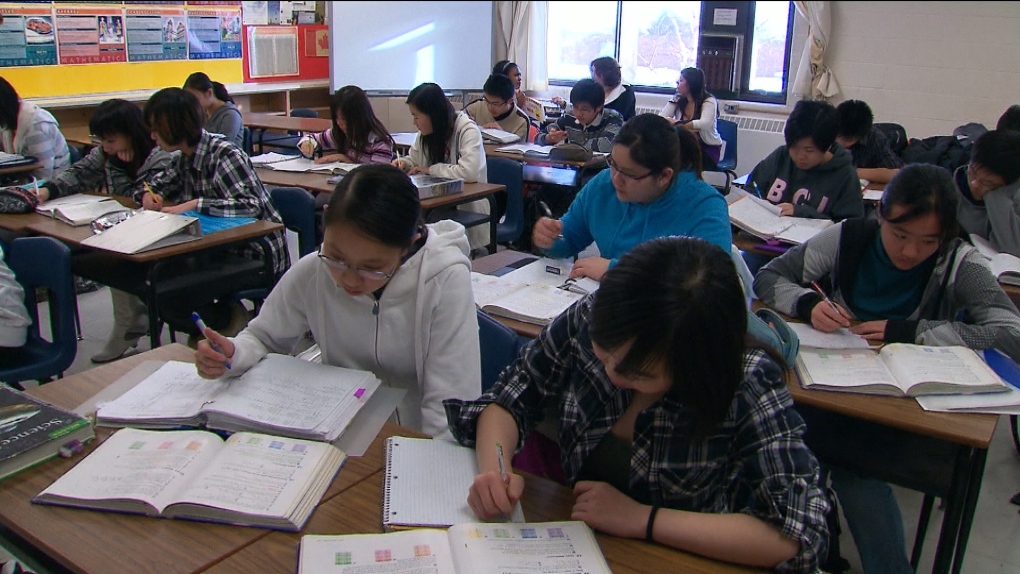'A problem as a society': Ontario's students, educators need more mental health supports, says report

Ontario schools are facing a mental health crisis and more supports are needed for both students and staff, a report by the non-profit People for Education (PFE) suggests.
The report is based on the results of a survey of more than 1,200 principals at approximately 1,000 Ontario public schools.
- Download our app to get local alerts on your device
- Get the latest local updates right to your inbox
It found that many students across Ontario continue to struggle with the “aftereffects” of the pandemic, including increased behavioural issues, difficulties with self-regulation, and other unaddressed mental health challenges.
The report also suggested that there is a lack of resources to respond to the worsening mental health in the classroom.
About 91 per cent of school principals, in fact, reported needing some or a lot of support for students’ mental health and well-being.
Only 9 per cent said they have regularly scheduled access to a mental health/addiction specialist or nurse, while 46 per cent said they have no access at all.
Nearly a third (28 per cent) of all elementary and secondary schools reported having no access to a psychologist, virtually or in person. This is almost double the percentage of schools that reported no access in 2011.
The data also found that rural schools are less likely to have access to psychologists, social workers, and mental health specialists compared to those in urban areas.
In some cases, principals said they have funding for mental health workers, but none are available in their communities.
Just over half (56 per cent) of participating elementary schools and 64 per cent of secondary schools reported collaborating with local mental health organizations.
Further, an overwhelming majority of schools (82 per cent) said they need more support staff like educational assistants, administrators and custodians.
MENTAL HEALTH AND WELL-BEING OF TEACHERS AND SUPPORT WORKERS ARE A CONCERN
Principals also noted that the mental health and well-being of their staff is of concern with many reporting burnout. This, they said, is leading to increased absenteeism and more pressure being put on remaining staff.
Those who responded to the survey said they want the Ontario Ministry of Education to “fund sufficient staff, increase access to family and community supports, and recognize the depth of the impact of the pandemic on school communities.”
People for Education is also calling for the creation of a cross-sector Health and Education Task Force that would “provide advice on long-term, integrated strategies to support students and staff.”
“(This task force) could provide advice on policies, programs, coordination of services, and funding to address the currently increasing demands for mental health and well-being supports across Ontario’s publicly funded schools,” Annie Kidder, PFE’s founder and executive director, said in a release.
During a follow-up interview, Kidder told CP24 that it’s important to understand that everything hasn’t just gone back to normal now that the height of the pandemic is over. People are still continuing to struggle, including students, she said.
“This isn't something we could just throw money at, but how do we ensure that we have health and education working together so that it's easier for schools to access mental health supports that are in community agencies or outside of schools or outside the school system,” she said.
“But we need to have that kind of framework or support to make it easier for schools to find that support as opposed to how hard it is right now.”
Kidder said on a school level PFE has been calling for “more focus early on, on helping kids to understand their feelings, their emotions, their relationships, even understanding when they need to go and ask for help.”
“I think nobody is asking schools to be places where, you know, people are treating mental illness. There's a big difference there, but people we do need to be kind of we need to be thinking of our schools, maybe even reimagining schools and understanding their place in health promotion,” she said, pointing to the prevention off issues further down the line.
“We have to seek schools as a great place to be doing this. But they have to have the support. They have to have the expertise, and we can't just keep asking them to do more, which is kind of what's happening right now.
Kidder also said that parents can and should play role in helping support their children’s mental health and well-being by checking in with them, asking them questions, and being mindful of how they’re doing.
In closing, she said she's both saddened and worried about the findings of the report.
“We can see from all of the research and reports that are coming out that we've got a problem as a society and our young people are struggling, partly from the pandemic, partly for lots of other reasons, but we have to take it seriously as a society,” Kidder said.
“This isn't just an education problem. It's a problem for all of us. This is our next generation here and they appear to be really struggling so I'm saddened by that, and by the fact that I'm not sure we're taking it as seriously as we should be.”
 Annie Kidder is the founder and executive director of People for Education.
Annie Kidder is the founder and executive director of People for Education.
The union that represents public elementary teachers, occasional teachers, designated early childhood educators, education support personnel, and professional support personnel across Ontario has also chimed in.
The Elementary Teachers’ Federation of Ontario (ETFO) said it wants the province to provide “adequate” mental health resources and funding, and school boards to deliver the comprehensive supports both students and educators need.
“(They) need an education budget that prioritizes their mental health, well-being, and academic success,” ETFO President Karen Brown said in a news release.
“The government must expand school-based resources, supports, and services to meet the growing mental health and well-being needs of students and educators in every region across Ontario. Those who live in rural communities deserve the same access to services as those who live in Toronto.”
ETFO recently made a submission to Ontario’s Standing Committee on Finance and Economic Affairs where they called for additional funding to be made available to improve access to in-school supports like guidance counsellors, social workers, psychologists, and child and youth workers, especially in underserviced areas.
They also want funding allocated for additional in-school and community supports, and the development of long-term, fully-funded mental health supports that are comprehensive and culturally responsive for students, in consultation with mental health experts, teachers, education workers, unions and other education stakeholders.
“Students rely on educators and other education workers to support their academic, physical, and socio-emotional needs. Without access to the critical supports and resources they need, many students, including those who are disproportionately impacted (e.g., students who identify as 2SLGBTQ+ and/or racialized) will continue to be underserved and at risk. At its core, this is a human rights issue that impacts student and member safety and well-being,” Brown said.
 Karen Brown is the president of the Elementary Teachers' Federation of Ontario.
Karen Brown is the president of the Elementary Teachers' Federation of Ontario.
Speaking with CP24 early Monday afternoon, Brown said she is not surprised to see the result of this latest study as challenges to meet mental health needs have long existed in schools, and have been “exasperated” by the pandemic.
“The lack of supports and resources for our students, the lack of psychologists, social workers, youth and child workers, that has been something we've been calling for, for more investments in the system. What we're seeing now is that those who are supposed to be supporting students are also under some of the burden and some of the stress,” she said, adding despite assurances of government investment being made, the deficit of mental health supports in schools is growing.
“Well, what we understand is only approximately nine per cent of schools actually have access to the mental health support that they need,” she said, noting the PFE report has “put some teeth behind what we're hearing and what actually is happening.”
Brown went on to say this is manifesting in more students visiting emergency rooms for issues of self harm and increasing mental health support equity and access issues in rural communities.
The learning gap that students are trying to address is being further challenged, she said, as educators are being pulled in so many directions due to the lack of mental health supports leaving families to pick up the slack and in turn adding to the stress of the situation.
 Ontario's Education Minister Stephen Lecce speaks to journalists at the Queen's Park Legislature in Toronto on Monday December 5, 2022. THE CANADIAN PRESS/Chris Young
Ontario's Education Minister Stephen Lecce speaks to journalists at the Queen's Park Legislature in Toronto on Monday December 5, 2022. THE CANADIAN PRESS/Chris Young
LECCE SAYS PROVINCE IS INVESTING IN MENTAL HEALTH SUPPORTS
During Question Period on Monday morning, Ottawa West-Nepean NDP MPP Chandra Pasma asked the speaker of the house why the Minister of Education is not providing the mental health supports needed in all of the province’s schools.
Pointing to the PFE report, which found that almost half of schools reported having almost no mental health services and few being able to access a psychologist, she said educators are trying their best, but are burning out. Pasma, who is the Ontario NDP's education critic, also said that in the end this lack of support is leading to an increase in violence in schools across Ontario and is “making it more difficult (for students) to catch up.”
Lecce, meanwhile, said the provincial government is doing its part and has increased its funding for mental health every year since coming in to office in 2018. He said currently that investment is at $90 million, noting year over year the province has hired nine per cent more mental health professionals to work directly with children as well as 7,000 more education workers.
The Minister of Education went on to say that this school year, they’re investing an additional $10 million for mental health supports for students “to ensure they have the services and supports they deserve.”
He also pointed to $130 million that has been dedicated specifically to supporting the mental health of children and youth at the community level through the creation of integrated youth hubs.
“We’ll continue to work together to meet the needs of our kids,” Lecce assured.
In a statement, Ministry of Education spokesperson Grace Lee further reiterated that the province is committed to investing in the mental health of Ontarians.
"Since day one, our government has increased funding in mental health, now by over 400%, along with a 9% increase in regulated mental health professionals in the last two years alone. Our government has funded the hiring of 7,000 additional education workers in our schools to better meet the needs of Ontario students, including the hiring of more social workers, and child and youth workers,” she said.
“We have invested $130 million in community based mental health services for children and youth and will continue to take action to support Ontario students."
Lee noted that these investments form part of the $485 million that is allocated every year to community-based mental health services for youth across Ontario.
She indicated that in every school board mental health leaders receive funding to “work with system leaders, educators and community partners to ensure supports are available to students.”
In high schools, mental health workers have provided promotion, prevention, early identification, assessment, and direct mental health services to students since 2018-2019. They’ve also enhanced and provided timely access through referrals to community mental health services for students in crisis; and supported students, families, and classroom strategies for educators.
Further, she noted that mental health professionals in schools are in place to provide direct early interventions for pupils with mild to moderate mental health issues. They also work with educators, principals and families to held support students’ continued learning and provide referrals to community support for those with greater or those in crisis.

According to recent data from Statistics Canada the mental health of young people age 12 to 17 is seeing an overall decline. In 2019, 73 per cent of youth in that age bracket described their mental health as “very good or excellent,” however by 2022, that number had declined to 61 per cent.
The Centre for Addiction and Mental Health also found that 59 per cent of Ontario students who responded to its surveys said the pandemic has made them feel depressed about the future with 33 per cent saying it has made their mental health worse.
CTVNews.ca Top Stories

W5 Investigates A 'ticking time bomb': Inside Syria's toughest prison holding accused high-ranking ISIS members
In the last of a three-part investigation, W5's Avery Haines was given rare access to a Syrian prison, where thousands of accused high-ranking ISIS members are being held.
'Mayday!': New details emerge after Boeing plane makes emergency landing at Mirabel airport
New details suggest that there were communication issues between the pilots of a charter flight and the control tower at Montreal's Mirabel airport when a Boeing 737 made an emergency landing on Wednesday.
Federal government posts $13B deficit in first half of the fiscal year
The Finance Department says the federal deficit was $13 billion between April and September.
Weather warnings for snow, wind issued in several parts of Canada
Winter is less than a month away, but parts of Canada are already projected to see winter-like weather.
Canadian news publishers suing ChatGPT developer OpenAI
A coalition of Canadian news publishers is suing OpenAI for using news content to train its ChatGPT generative artificial intelligence system.
Cucumbers sold in Ontario, other provinces recalled over possible salmonella contamination
A U.S. company is recalling cucumbers sold in Ontario and other Canadian provinces due to possible salmonella contamination.
Nick Cannon says he's seeking help for narcissistic personality disorder
Nick Cannon has spoken out about his recent diagnosis of narcissistic personality disorder, saying 'I need help.'
BREAKING Supreme Court affirms constitutionality of B.C. law on opioid health costs recovery
Canada's top court has affirmed the constitutionality of a law that would allow British Columbia to pursue a class-action lawsuit against opioid providers on behalf of other provinces, the territories and the federal government.
Real GDP per capita declines for 6th consecutive quarter, household savings rise
Statistics Canada says the economy grew at an annualized pace of one per cent during the third quarter, in line with economists' expectations.


































